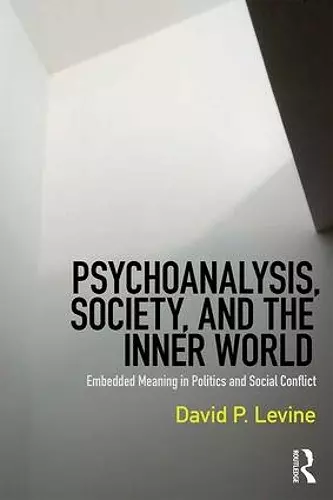Psychoanalysis, Society, and the Inner World
Embedded Meaning in Politics and Social Conflict
Format:Paperback
Publisher:Taylor & Francis Ltd
Published:14th Feb '17
Should be back in stock very soon
This paperback is available in another edition too:
- Hardback£170.00(9781138217362)

Psychoanalysis, Society, and the Inner World explores ideas from psychoanalysis that can be valuable in understanding social processes and institutions and in particular, how psychoanalytic ideas and methods can help us understand the nature and roots of social and political conflict in the contemporary world.
Among the ideas explored in this book, of special importance are the ideas of a core self (Heinz Kohut and Donald Winnicott) and of an internal object world (Melanie Klein, Ronald Fairbairn). David Levine shows how these ideas, and others related to them, offer a framework for understanding how social processes and institutions establish themselves as part of the individual’s inner world, and how imperatives of the inner world influence the shape of those processes and institutions. In exploring the contribution psychoanalytic ideas can make to the study of society, emphasis is placed on post-Freudian trends that emphasize the role of the internalization of relationships as an essential part of the process of shaping the inner world.
The book’s main theme is that the roots of social conflict will be found in ambivalence about the value of the self. The individual is driven to ambivalence by factors that exist simultaneously as part of the inner world and the world outside. Social institutions may foster ambivalence about the self or they may not. Importantly, this book distinguishes between institutions on the basis of whether they do or do not foster ambivalence about the self, shedding light on the nature and sources of social conflict. Institutions that foster ambivalence also foster conflict at a societal level that mirrors and is mirrored by conflict over the standing of the self in the inner world. Levine makes extensive use of case material to illuminate and develop his core ideas.
Psychoanalysis, Society, and the Inner World will appeal to psychoanalysts and to social scientists interested in psychoanalytic ideas and methods, as well as students studying across these fields who are keen to explore social and political issues.
"I have been privileged to read several of David Levine’s books which bring psychoanalytic theory, long misunderstood as applicable only to work with individuals, to a broader audience. In this excellent book, Professor Levine shows how psychoanalytic principles and concepts can be translated meaningfully into the everyday life of us all. He expertly illustrates the applicability of psychoanalysis to society in its broadest sense, and to the organisations and groups of which it is constituted. This is accomplished most notably in Part III and especially the discussion of moral order and of the method of introspection, which follows up on his earlier work, The Capacity for Ethical conduct and deals with matters of increasing importance internationally. Any reader interested in society, politics, and organisational life, cannot but be enriched by this generous and clear contribution."-Dr Stanley Gold, Past President, International Society for the Psychoanalytic Study of Organisations. Member and Consultant for Mental Health Tribunal, Victoria, Australia.
"With so much turmoil and uncertainty in today’s world we desperately need the tools to look below the surface for understanding and for thoughts about moving forward that don’t rely on simplistic or stale ideas. David Levine offers such a perspective in this wonderful volume. Most importantly he shows how the individual and social intersect and deep levels, and how human vulnerability can be either a source of empathic connection or destructiveness."-James Krantz, Managing Principal, Worklab Consulting; former President, International Society for the Psychoanalytic Study of Organizations; former faculty, Wharton School of Business and Yale University.
"I have been privileged to read several of David Levine’s books which bring psychoanalytic theory, long misunderstood as applicable only to work with individuals, to a broader audience. In this excellent book, Professor Levine shows how psychoanalytic principles and concepts can be translated meaningfully into the everyday life of us all. He expertly illustrates the applicability of psychoanalysis to society in its broadest sense, and to the organisations and groups of which it is constituted. This is accomplished most notably in Part III and especially the discussion of moral order and of the method of introspection, which follows up on his earlier work, The Capacity for Ethical conduct and deals with matters of increasing importance internationally. Any reader interested in society, politics, and organisational life, cannot but be enriched by this generous and clear contribution."-Dr Stanley Gold, Past President, International Society for the Psychoanalytic Study of Organisations. Member and Consultant for Mental Health Tribunal, Victoria, Australia.
"With so much turmoil and uncertainty in today’s world we desperately need the tools to look below the surface for understanding and for thoughts about moving forward that don’t rely on simplistic or stale ideas. David Levine offers such a perspective in this wonderful volume. Most importantly he shows how the individual and social intersect and deep levels, and how human vulnerability can be either a source of empathic connection or destructiveness."-James Krantz, Managing Principal, Worklab Consulting; former President, International Society for the Psychoanalytic Study of Organizations; former faculty, Wharton School of Business and Yale University.
ISBN: 9781138218222
Dimensions: unknown
Weight: 228g
136 pages